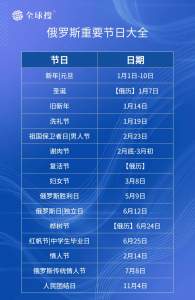The development of the Russian Internet
It is reported that from 2012 to 2022, the proportion of Russian Internet users continued to grow, exceeding 80% for the first time in 2018, and reaching 88% by 2021. It is estimated that as of 2021, approximately 125 million people in Russia are already active Internet users. By 2023, nearly 100 million people in Russia will use the Internet every day!

01 The Three Russian Internet Giants
Yandex ranks first. It has 60% market share in Russia in search and has the largest contextual advertising system. (2022InvestingPro)
Mail.Ru Group is in second place. The company owns the two largest Russian-language social networks, VKontakte (VK) and Odnoklassniki (OK).
The third place is Avito.
Russian society has a high level of digitalization, high Internet penetration and e-commerce user penetration, and consumers have basically developed online shopping habits. In 2022, the penetration rate of Russian Internet users will be approximately 89%; there will be approximately 106 million smartphone users, with a penetration rate of 73.6%. Russian society has passed the early stages of building trust in online shopping.
02 Development characteristics
01
The rapid development of mobile Internet
According to statistics, the number of mobile Internet users in Russia has exceeded the number of PC Internet users, which means that mobile Internet has become the main direction of Russian Internet development.
02
The rise of e-commerce
With the changes in the consumption habits of Russian Internet users and the popularity of online payment methods, e-commerce has begun to rise and develop rapidly in Russia.
03
The popularity of social media
Popular social media platforms in Russia include VKontakte, Odnoklassniki, Facebook, etc. These platforms have a large user base in Russia and are important channels for people to communicate, share and obtain information.
04
Increased cyber security awareness
More and more Russians are paying attention to network security and taking various measures to protect their personal information and property.

Analysis of Russian Internet User Habits
01 Russian netizens are keen on using social media platforms for daily communication and obtaining information, among which "VK" and "Odnoklassniki" are the most popular.
02 Russian netizens share their life details on social media, including photos, videos and mood states. They can also join different interest groups and participate in various activities.
03 Russian netizens pay more attention to online communication, participation in communities and forums, and relatively rarely use social media platforms such as WeChat.
04 Russia’s online shopping industry is developing rapidly, and more and more young people choose to shop online.
05 Fashion, beauty and personal care, and electronic equipment are the most popular categories in the Russian e-commerce market. Increased online website traffic for the beauty market and affordable luxury jewelry market. The demand for smart home products is increasing. The convenience of Internet shopping and the use of gift cards have also become hot topics.
The development path of Russian e-commerce

Russian e-commerce retail sales
01 According to data from the Russian Association of E-commerce Enterprises (AKIT), the number of Russian e-commerce users has also increased from 51.55 million in 2017 to 68.13 million in 2022, and is expected to reach 75.4 million by 2027.
02 Russia's e-commerce consumption will grow from 260 billion rubles in 2010 to 4.986 billion rubles in 2022, with a compound annual growth rate of approximately 27.91%, outperforming the global average of 14.28%.
03 The continued digitalization of society is one of the important factors driving the growth of the Russian e-commerce market. At the same time, its e-commerce users are penetrating into all age groups. A study by Yandex.Market Analytics shows that the number of e-commerce users in Russia increased by 40% in April compared with January 2020. Among them, the largest increase was in the audience under 17 years old - this type of users increased by 65%. In second place are those between 18 and 24 years old (+62%), and in third place are those between 35 and 44 years old (+47%). Among users over the age of 55, they are 32% more interested in online shopping. And as of 2023, this data is still growing.
Characteristics of Russian Internet users’ purchasing behavior

01 Doesn’t like to chat – After Russian customers get the information they want, they basically don’t reply until they make a decision to cooperate with you.
02 Like to communicate in Russian - Russians have a strong sense of identity with their mother tongue, and communicating with them in Russian will make them feel happy.
03 Like to shop on Thursdays - Thursday is the highest average spending day of the week for Russian online consumers, 57% higher than Monday. Russian residents like to stock up on everything they need before the weekend and then spend Friday and Saturday nights resting and having fun.
04 Don’t procrastinate - Once the intention to cooperate is confirmed, other suppliers will usually be given up directly.
05 Ability to purchase - As of 2022, the Russian Federation has a population of approximately 140 million, a huge market, per capita GDP exceeding US$15,000, and good social welfare benefits.
06 Quotation Comparison - Russians are very good at bargaining. First, external bidding was launched, attracting several competitors, and various means of dissension were adopted to allow the opponents to compete with each other to lower the price, and finally profit from it.
07 High loyalty - Russia has a lot of repeat customers. Generally speaking, as long as the price is reasonable and the quality is acceptable, cooperative customers will be given priority.
08 Lazy and procrastinating - the communication cycle with Russian customers is generally longer.
09 Young people are more likely to accept advanced things
10 Pay attention to quality - when introducing products to Russian customers, you can highlight the product advantages and high-quality materials. At the same time, perfect after-sales service and technical support are also very good points!
11 Like to negotiate with stable and experienced people - In Russia, people without 15-20 years of work experience are not allowed to negotiate on behalf of the company. Russian companies tend to respect the elderly.
12 Pay attention to festivals

Post time: Jan-11-2024





